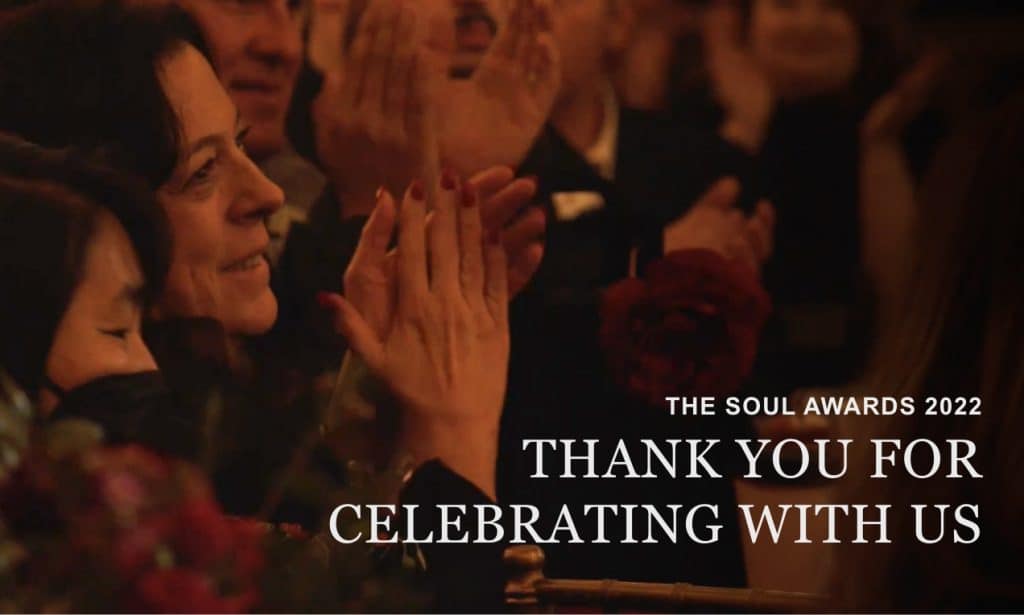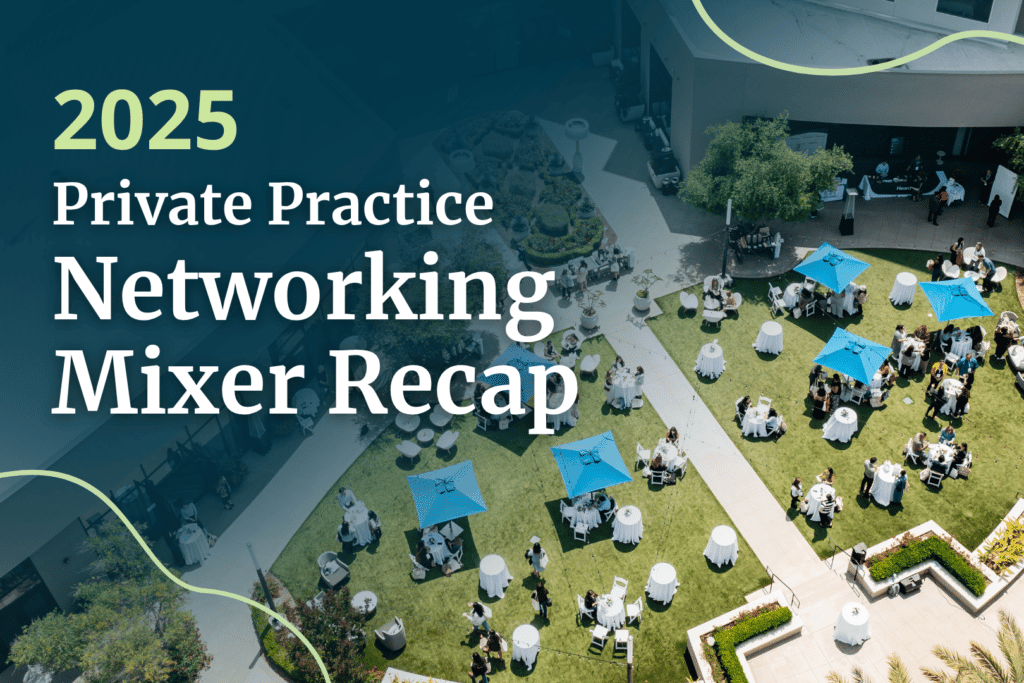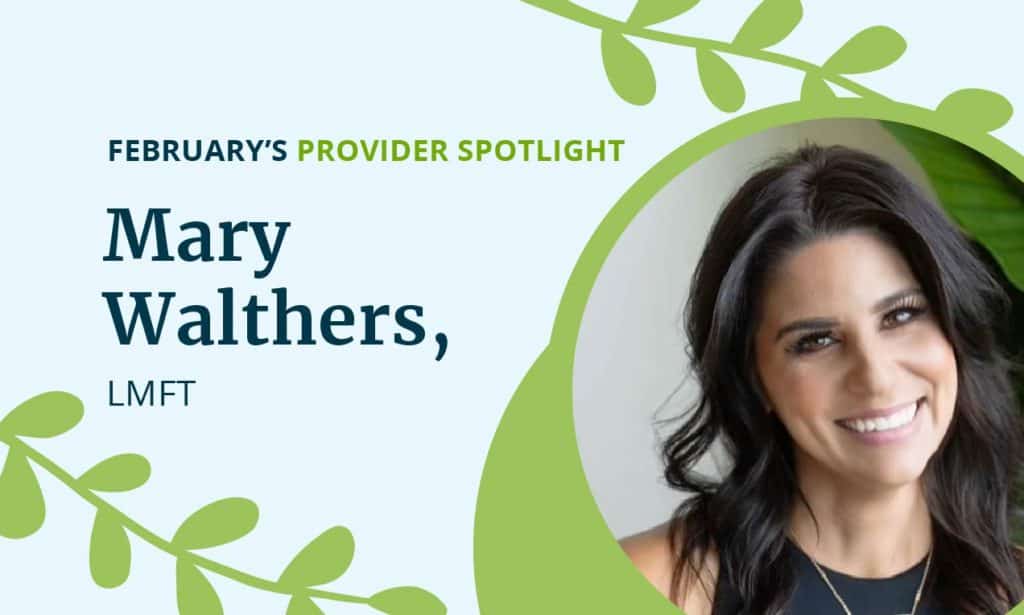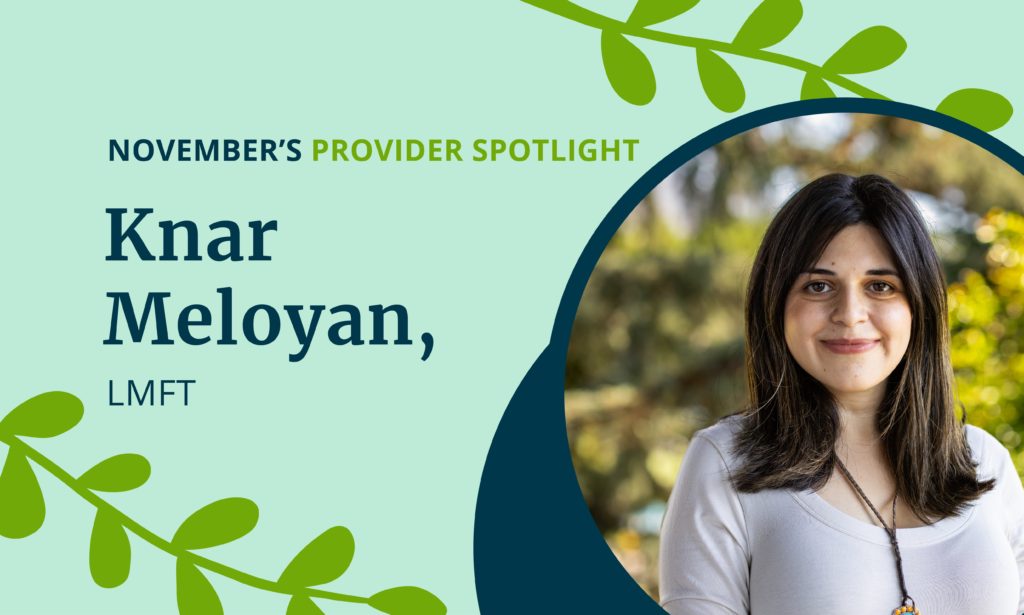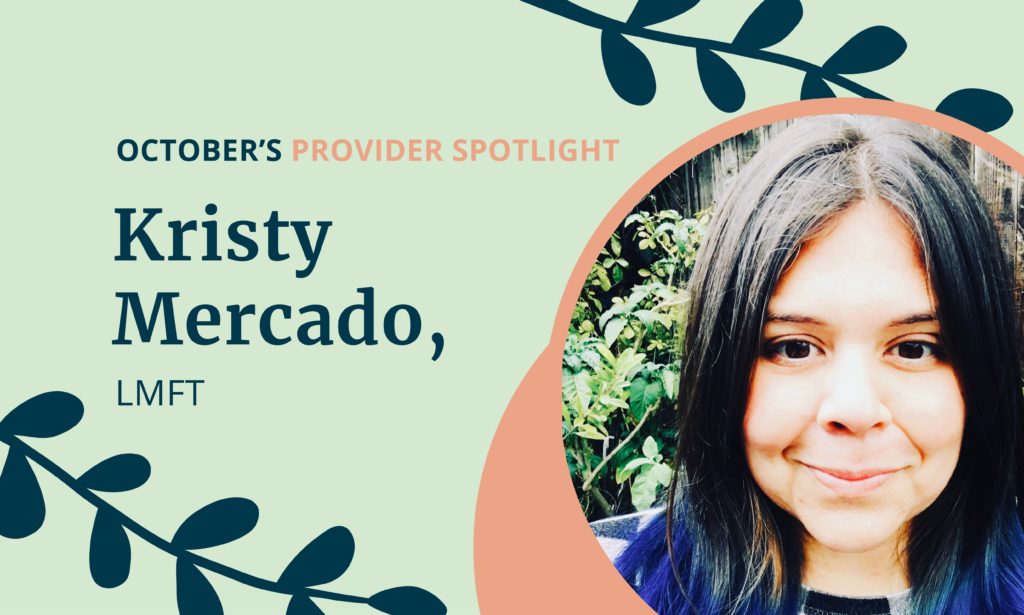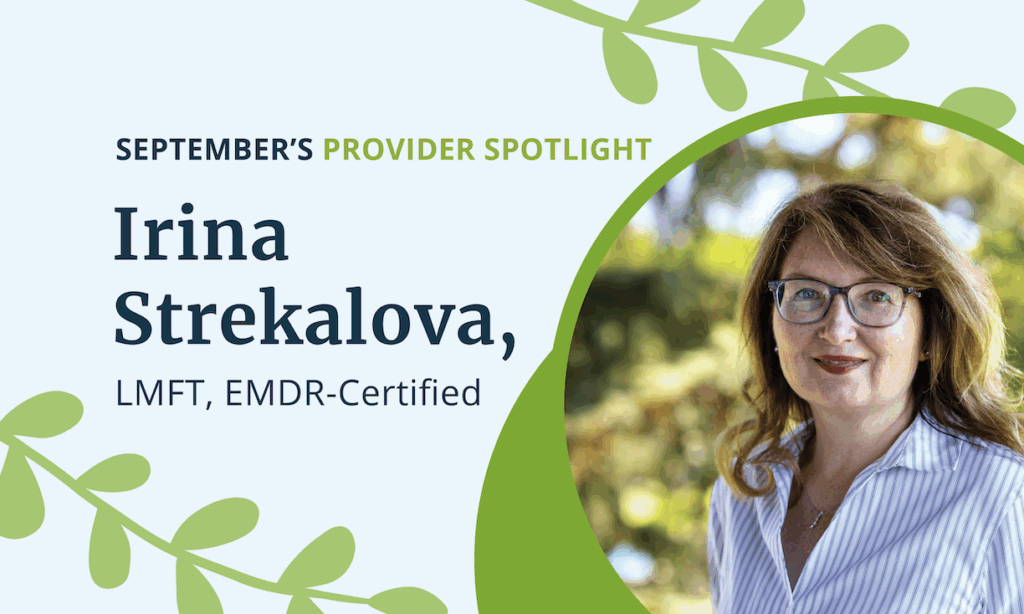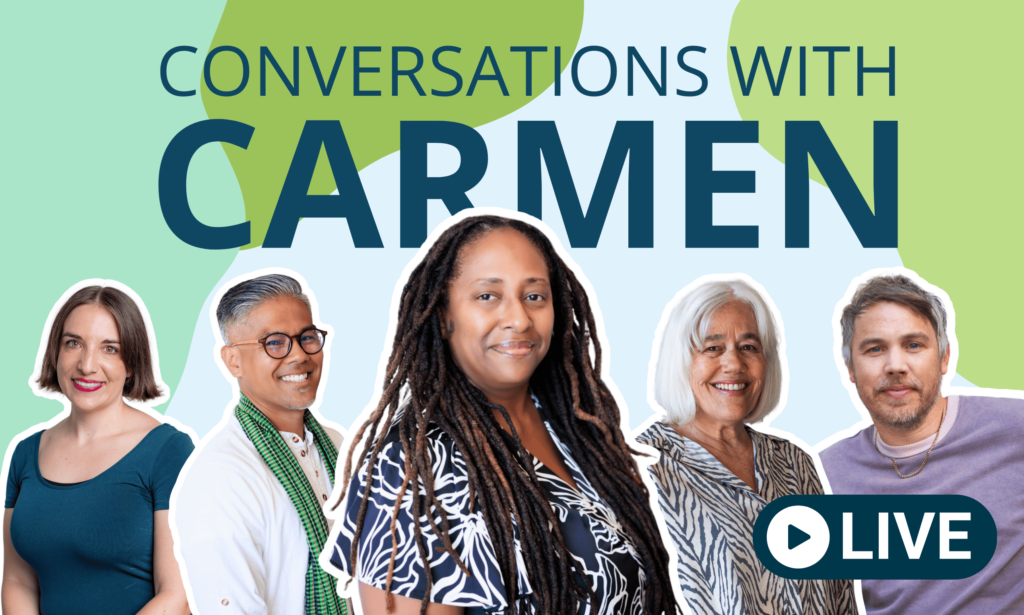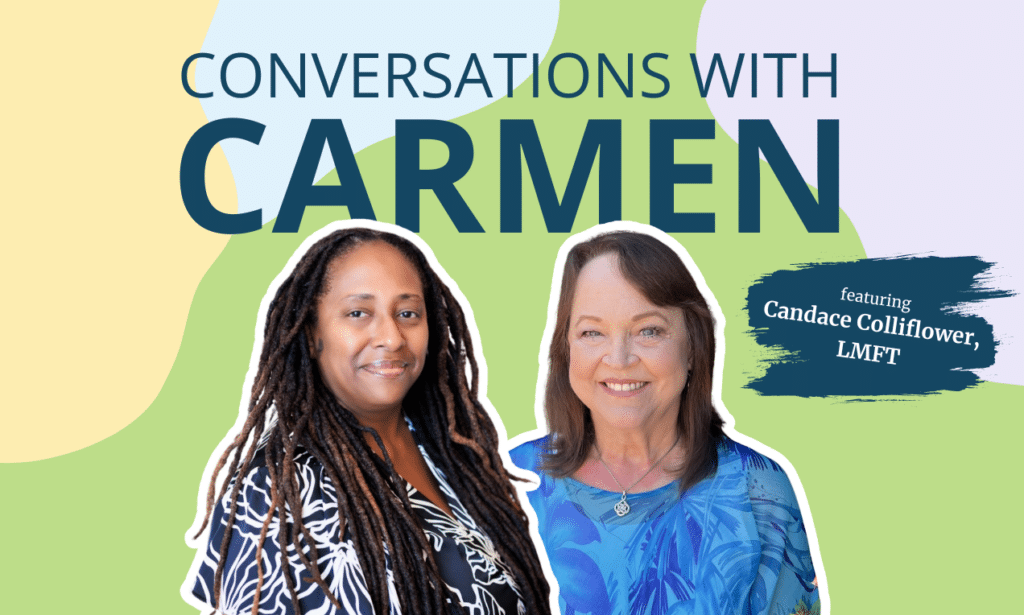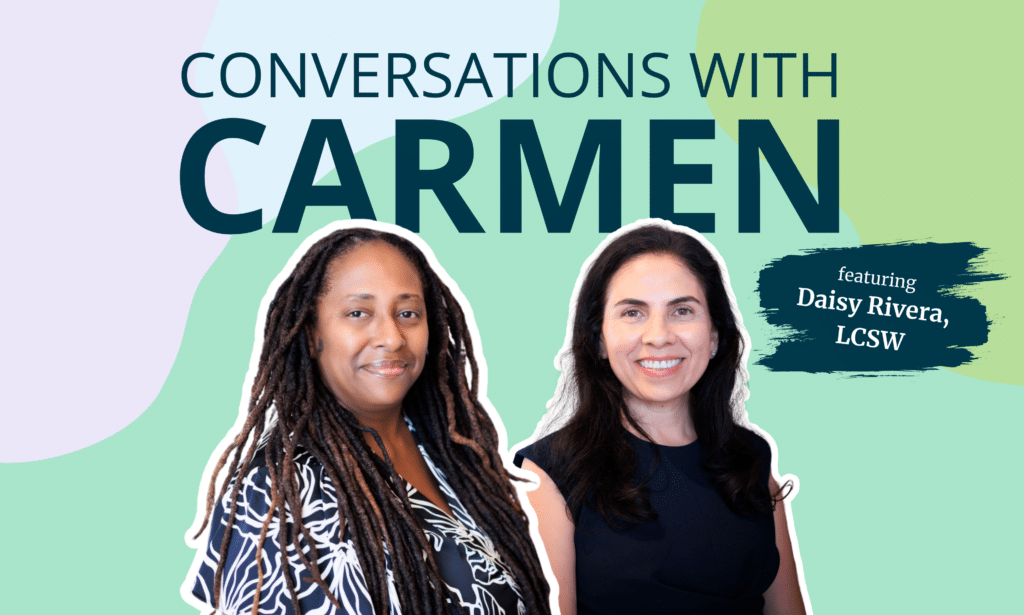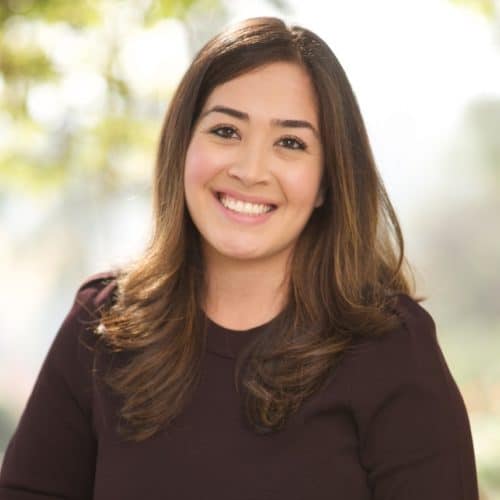
Every month we highlight a provider as our Provider Spotlight and each Provider Spotlight is interviewed by Dr. Carmen Majied for a segment called Conversations with Carmen. Our Provider Spotlight this month is Adriana Avila.
In this month’s segment, Carmen and Adriana discuss Adriana’s journey as her family’s first college attendee, her work with sexual abuse survivors and her meeting with the Stanford Prison Experiment’s creator. Watch the video or read the full interview to hear more from Adriana about her specialty in grief and how the grief specialty chose her.
Are you a native Californian? Where did you grow up? Where would you say your fondest childhood memories took place?
Although I was born and raised in California, in early childhood I moved from California to Mexico, lived in Mexico for about a year, and finally settled in Monrovia when I was in fourth grade. I have been a Monrovian since then. My fondest childhood memories were in Mexico with my grandparents. Those memories I cherish with all my heart. My grandfather had a store in Mexico and I loved helping him run the store. I loved the food, the family aspect, the warmth, and the small town feeling.
You shared that attending college was not initially on your radar/an interest of yours. Can you share who and/or what inspired you to pursue a college degree?
Attending college was not on my radar because I had no idea what the process was like, I had to figure things out on my own. I am the eldest of five sisters, my parents immigrated from Mexico, and attending college seemed far fetched for me. My grandfather passed away when I was 16 and his teachings guided me in many ways. Education was one of them, and my avid teacher Ms. Harrison had a great impact on me applying for school. I had a conversation with her and told her: “I am going to a community college, university is not for me” and she replied: “you are going to a 4-year school and you need to apply to 5 or more schools.” Her guidance made a huge difference in my life and the rest is history.
You shared that you were a first generation college student. How would you say that impacted your post-high school journey?
It made me value my journey and not take it for granted. My dad worked day in and day out to make ends meet, my mother stayed home to take care of us, and I knew I needed to do something different. I started working at age 16 to help my parents. I afforded my entire tuition at Cal Poly by working at Mimi’s Cafe as a server, which I loved. Just like going to a university was not on my radar, neither was pursuing a masters or doctorate degree. So, I thought to myself, once I finish Cal Poly I am done. But, once I finished Cal Poly and realized there was more for me to explore, I realized the possibilities were endless for me. I knew in my heart there was more to my story.
You mentioned that when you entered your freshman year at Cal Poly you declared a Business (emphasis in Human Resources) major and a Psychology minor. What fueled your interest in Business at that time?
What fueled my interest in business was security and stability. At that time I did not think I would pursue a graduate program, so, business seemed like the way to go. I also loved business since I was younger because I saw my grandfather own his own business.
What was your original goal in terms of a professional trajectory?
My original goal was to get my Business degree and work in Human Resources. But it was not until I was in graduate school that I dared to dream bigger.
How did you imagine Business and Psychology would intersect?
I never imagined them intersecting, but I loved that they did.
Subsequent to your undergraduate journey, you pursued and graduated with your Masters degree in Psychology. Can you share what some of the highlights and takeaways were during that process, including conducting research with a CSULA professor, presenting a research paper at WPA- Western Psychological Association and volunteering at Project Sister?
Conducting research was a rewarding experience. I met a lot of people and attending the conference was fun. I was able to meet Dr. Zimbardo, creator of the Stanford Prison Experiment, and that was so cool because I had learned about the prison experiment in undergrad and had read his books. And Social Psychology always intrigued me, so meeting him was pretty cool. Being part of Psi Chi (the Psychology National Honor Society) and holding office as the vice president was fun. I got to meet so many people, worked with my mentor, Dr. Bui, and attended the WPA conference again in graduate school. But rather than presenting, I was a Psi Chi member attending the conference. Volunteering at Project Sister was a valuable experience. I also met a lot of people, worked with law enforcement, and immersed myself in being an advocate for others. It fueled my passion for my career. I knew this is where I belong.
Can you elaborate on what Project Sister is? And what was your experience like collaborating with victims and Law Enforcement?
Project Sister is a non-profit providing support to survivors of sexual abuse in L.A. and San Bernardino Counties. As a volunteer, I worked the 24-hour crisis line, responded to calls, provided resources and accompanied victims to the hospital and police departments. I worked alongside forensic nurses and coordinated police briefings with the watch commanders in the cities we served. Providing resources, connecting individuals and families with services, as well as working in the community continued to fuel my passion in my career.
You shared that accruing your practicum and intern or associate hours consisted of working in CMH (Community Mental Health). Can you share a bit about that journey?
I did my practicum at Foothill Family Service- which I loved. I immediately became super involved. I provided individual therapy, ran substance abuse groups, children’s groups, and parenting groups. I also helped administer PTSD assessments at an elementary school. My experience was rewarding and when I was completing my practicum, I was located at the site where the Wraparound team worked. I knew I wanted to work in Wrap one day- which I did.
You shared that an enjoyable aspect of your licensure process involved working as a Wraparound Facilitator. Can you explain what Wraparound is and what the specific role of a Facilitator consists of?
Wraparound is an intensive program whereby a team of versatile providers work to serve families. The team is composed of a parent partner, a child specialist and a facilitator. I was a facilitator in the Wraparound program. I also worked in other intensive programs such as IFCCS (Intensive Field Capable Clinical Services) and FSP (Full Service Partnership). As far as Wraparound is concerned, the role of a facilitator is to coordinate meetings, link families with resources, work as a team with the parent partner, child family specialist, and any one involved on the case (i.e., DCFS, probation, therapist, psychiatrist, parents, foster parents etc.). I was responsible for opening cases, going to the homes, initiating services as well as coordinating services. This was a 24/7 job, so, there were times I worked a 12-hour shift, got a crisis call at 3am, then went back to work that same day. I loved it. My teams were awesome and we all went through a lot together; I helped many people and I did a lot of community work. But, I knew that I wanted to leave loving my experience (rather than feeling burned out) and that is when Soultenders magically appeared. I ultimately took the risk, despite my cultural upbringing.
Your journey with Soultenders began in 2017. You shared that you were initially hesitant to transition to private practice (noting that you “never imagined [yourself] in private practice”). You also shared that some of your initial apprehension was linked to “cultural” concerns. Those were poignant statements that you made. Can you please expand?
I never, and when I say never, I truly never imagined myself in private practice. I had the belief that private practice was for affluent people. I asked myself: “how would I know how to run a practice?” It didn’t even dawn on me that I had a Business degree. And despite those fears, I took the risk. I am a risk taker by nature, I leap into faith, and let myself be guided. I don’t like staying in my comfort zone. And a big component of the apprehension were cultural norms. My parents immigrated to this country, both when they were teenagers. Hard work, no days off, and stability and security were values I learned early on. I was expected to work at a job that provided me a 401k, provided a stable paycheck, insurance, and eventual retirement benefits. I was expected to work for someone my whole life. But since I was a child, I knew I wanted to be my own boss. So despite cultural messages, I took the risk and it has been the best risk I have ever taken. I was able to flourish as a therapist and was guided to help those in grief.
In addition to maintaining your private practice, you’ve also remained affiliated with Soultenders by facilitating community health fairs, fostering marketing efforts as well as functioning as a Provider Support Specialist for our Arcadia office! What were some noteworthy takeaways from each experience?
I loved it. As you may have noticed, I love being in community, I love immersing myself in the work that I do, I love to help, meet people, and share knowledge and resources. So, as soon as I started at Soultenders, I jumped right in and I asked Virginia, “how and what can I do more of?” And I launched into facilitating resource fairs and sharing our provider network information. I also did a lot of the networking and marketing for new offices because when I started we did not have all the offices we have now. I wrote a newsletter, I interfaced with pediatricians, such as at UCLA, and so many others, simply spreading the word. Subsequently, I stepped into the Provider Support Specialist role and I loved every second of it because I was able to guide new clinicians seeking to cultivate their practice. I also provided on-boarding services for new clinicians, this is how I was able to meet so many of you. My journey at Soultenders has been expansive. I did things I didn’t even know I could or would do.
Within the last year, you made the decision to transition away from your Provider Support Specialist role due to the continued growth of your practice, including a significant increase in requests for your grief related services. You shared that this is what led you to pivot in the direction of creating grief as a specialty area or clinical niche. What are you willing to share about that journey?
I tend to listen to my heart when transitions are approaching. As you may have noticed, my life has been full of transitions, growth, and new beginnings, professionally and personally. And this was one of them. I knew I had done what I needed to do as a PSS, but life was guiding me towards a different path. In 2019 and 2020, I started immersing myself in the grief world. I took grief courses, took David Kessler’s grief educator certificate, became certified in grief yoga, and became trained and certified in EMDR, all of which led me to want to grow as a therapist. Grief knocked at my door early in life, and it is humbling to know I am now able to support those in grief.
When we initially spoke in preparation for this interview, you stated: “the grief specialty chose me” and “providing support to others through grief counseling is where I belong”. Please help us understand the significance of these two statements.
I did not wake up one morning and say: “grief is my specialty.” My life journey led me to take on this path. I needed to immerse myself in the grief world because I wanted to understand grief, I wanted to connect deeper with my own grief, and find ways to help others. I have felt the depths of pain and the isolation grief can bring and I wanted to be a changemaker. My grandfather’s death when I was 16 shook my world and turned my world upside down. I was not the same Adriana after he passed away. One day my grandpa was here, the next day, he was gone. “How do I digest that at age 16 on my own?” At that time, my family was not one to speak about feelings. So, I realized I needed to do it alone. I became a workaholic in order to cope. Subsequent deaths happened after my grandpa passed away, as in 2020, my grandmother and two of my dogs passed away all within one month of each other. So, again, I happened to be faced with the depths of pain and I knew that I had to continue doing the grief work to give meaning to those who had passed away. That does not mean I was or am okay with their passing, it just meant that I turned pain into purpose, and my purpose is to help those who are navigating grief, which is why I say, “providing support to others through grief counseling is where I belong.”
You shared that David Kessler (The 7 Stages of Grief) and Paul Denniston (Grief Yoga) are two of your professional mentors. How has each of them influenced the way in which you conceptualize grief as well as your treatment approach when addressing clients’ unique experience of it?
David and Paul have been instrumental in my work. Through David’s work, I have learned that grief does not need “fixing,” it needs space to be witnessed. And through Paul’s work I have learned to move the focus from the mind to the body. I attended a retreat with David, pre-COVID and Paul was there. He guided us through a 15-20 minute yoga practice and I fell in love with it. I started crying. Feelings I thought I had processed, but hadn’t, surfaced in my body and that is when and where I became intrigued healing through grief. I am a very curious person, and if something intrigues me I want to learn more. So, I approached Paul and asked, “how do I learn what you are teaching?” At that time, he had not created any courses yet. Fast forward to 2020, I took Paul’s first-ever course in the Spring of 2020, a grief movement course. I knew that was only the beginning for me, so I asked him how to become a grief yoga instructor and he connected me to core power yoga, where I took the 200-hour teacher training and became yoga certified. Subsequently, Paul happened to start the grief yoga teacher course in Fall of 2020. I took that course and became grief yoga certified. Around the same time, David created his first-ever grief educator certificate program and I jumped on board, including signing up. I joined his first-ever cohort. Through David and Paul, I have met wonderful people and mentors such as Rachel Hanfling, and she is a communication coach, and Nancy Levin, another coach. Throughout my journey, I have developed my own communities because for me community is huge, its healing and it’s part of my culture.
In addition to so many other wonderful attributes, you are EMDR trained and certified. How do you incorporate EMDR into your practice? What was the training/certification process like for you?
I absolutely love EMDR. I took the EMDR training in 2020. 2020 was a challenging, yet transformational year for me. I incorporate EMDR in my therapy sessions and I share the benefits of EMDR with clients. And ultimately, people decide if it is something they want to take part in. EMDR is helpful when trauma is blocking the grief and it allows for organic grief to flow. I used EMDR when my dog Mufasa passed away. He was fine the night before; I woke up Saturday morning only to find him no longer alive, in the backyard. Thinking of that memory would previously throw my nervous system off radar. Not to mention, it was blocking my grief. I utilized EMDR and the grief began to flow out. When I recall that memory nowadays, I sometimes recall the sadness, but reflecting back on the incident no longer shocks my nervous system.
The training and certification process has been amazing. Cecilia Penailillo has been my mentor and the experience has been rewarding. I love helping her facilitate trainings and learning from her. I am also a consultant in training and I have started doing consultations for therapists who want to become certified. Along with being EMDR trained and certified, I also completed a 300-hour course in Trauma-Informed Yoga, another tool that I share with my patients.
We talked a little bit about your professional ‘bucket list’ and what that includes at this point. You mentioned a desire to facilitate educational courses regarding “pet loss”, an inclination to continue interfacing with the community by providing mental health presentations and equipping others with helpful resources as well as eventually pursuing your Doctorate degree. We would love to hear more about these aspirations! Can you please elaborate?
Yes, I would love to share more. I am a curious person, a person that loves to grow and learn, and to step into new arenas. I want to facilitate courses such as pet loss and grief. Grief encompasses so many arenas; breakups, moving (whether it is from one country to another, one city to another, or a home), being diagnosed, aging, empty nest experience, infertility, etc.. With that being the case, I would love to continue to expand on the courses that I create and develop. With that said, community work has been and continues to be important in my life, so, I want to continue being part of the community at large by facilitating presentations, attending health fairs, and any other way that I can connect with others. And yes, my long term goal is going back to school and pursuing a Doctorate degree. Pepperdine is my dream school. I love doing research, I love doing clinical work and most of all, I love my career. I am humbled to do the work I do and want to continue to grow. I do have other interests as well, such as Neuroscience and Sports Psychology, as well as helping Veterans and their families. So, for now, I am focused on my work. And as far as my future trajectory is concerned, I will see what continues to unfold. I am excited to see what life has in store for me.
Is there anything else that you would like us to know about you, Adriana?
Let’s see. I love to run, work out and do yoga. I love my dogs, I love to travel and I love to spread kindness and compassion. So, any chance you have, I say one should spread kindness. We never know what someone is going through; and an act of kindness can make a world of a difference to that person.

